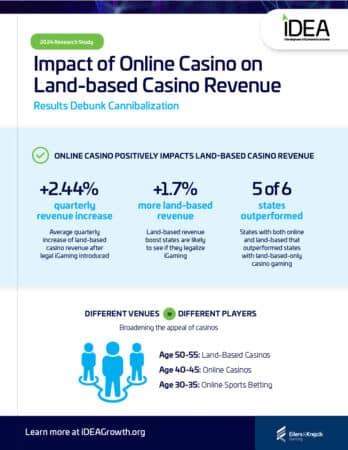Impact of iGaming on Land-Based Casino
How the introduction of online gaming impacts land-based performance
iDEA commissioned a study from Eilers & Krejcik Gaming (EKG) to assess how online gaming impacts land-based casino performance. The report is the most comprehensive analysis conducted to date on this topic in the United States.
Ultimately, data from this in-depth study reveals that, in addition to adding a revenue stream for land-based casino operators, online gaming helps boost revenue for operators’ brick-and-mortar properties.
The study reveals an average quarterly revenue boost of +2.44% from the introduction of iGaming across the six U.S. states that currently have both land-based casinos and legal online gaming.
The EKG team of economists, data analysts and industry experts compared the quarterly growth rates of the six states that have legalized iGaming with a selection of land-based-only casino states. They found that five of the six states with legal iGaming outperformed the land-based group over the same time periods.
EKG also used advanced mathematical modeling techniques to study the potential impact of the introduction of iGaming in land-based casino states that have yet to legalize the online channel. They concluded that the typical state would boost casino revenue by +1.7% annually after introducing iGaming.
As part of their research, EKG dissected a research note by Deutsche Bank, and a study on iGaming by The Innovation Group. Several methodological flaws were found in these studies when considering potential cannibalization.
Both failed to compare the time periods before and after each state launched online casinos - an obvious limitation if the goal is to study the impact of online casino introduction.
Other issues with the previous studies included double-counting population growth, ignoring the effects of COVID-19 on certain jurisdictions and including children as part of the potential population of gamblers. The result was an “apples-to-oranges” comparison.
The EKG methodology looks at the impact of online casinos on land-based casino revenue in each state that has launched online casinos individually. This more intuitive approach shows that online gaming has positively impacted land-based revenue.
NJ Economic Impact Study
iDEA's proprietary research quantifies the economic impact and assesses the social impact of legal online gaming in the state of New Jersey. This groundbreaking study has been updated for 2020 and includes data from six years of legal, regulated online gaming in the state. New Jersey’s experience provides valuable lessons for other U.S. states in creating an operating environment and regulatory structure to implement, oversee, and realize the benefits of responsible, regulated online gaming.
Impact of Onsite In-Person Registration on Sports Betting
As legal sports betting grows across the U.S. individual states must consider how consumers set up access legal sports betting accounts. One approach includes in-person registration requirements for online sports betting accounts. This analysis explores the potential ramifications of in-person registration requirements on revenue generation for state governments and the competitiveness of legal markets.
iDEA's Responsible Gaming Initiative
See how we ensure the fairness of the game, the safety of
consumers and children, and the security of player information.


























